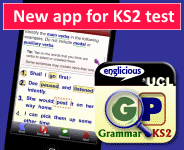Glossary
The Englicious Glossary includes the new National Curriculum glossary terms, which are shown against a white background. However, there's much more to be found here:
- we have added many entries that we feel are important, but cannot be found in the NC Glossary (e.g. connective), and
- in many cases we have added information to the (often very brief) NC entries that need further explanation (e.g. clause and phrase).
Please note that in line with our practice throughout the site, we use capital letters for function terms such as Subject, Direct Object, Indirect Object, Modifier, etc. Although this convention is not followed in the documentation published by the Department for Education we have also done so in the text that forms part of the National Curriculum Glossary.
Tip: Within our units and resources, Glossary items appear highlighted within the text. When you hover over them, or click on them in the Slideshow, a popup is generated.
main clause
A sentence contains at least one clause which is not a subordinate clause; such a clause is a main clause. A main clause may contain any number of subordinate clauses.
- It was raining but the sun was shining. [two main clauses]
- The man who wrote it told me that it was true. [one main clause containing two subordinate clauses.]
- She said, “It rained all day.” [one main clause containing another.]
A main clause is a clause which is not subordinate to any other clause and can stand alone as a sentence, e.g. I saw them last night. It differs from a subordinate clause, which functions as part of a larger clause.
main verb
mass noun
metaphor
Metaphor is, however, pervasive in everyday language and can operate to shape our way of seeing things. Thus, 'argument' is regularly expressed in terms of to 'war' (we defend a point, attack an idea, marshall facts); we live by metaphors of time analogised as if it were a commodity - thus we spend and waste time. Such metaphors are 'dead metaphors' or sufficiently 'frozen' for them to be not really noticed, though they reveal much about how individuals and cultures shape meanings.
modal verb
A modal verb is an auxiliary verb which expresses modality (meanings to do with what is possible, necessary, and so on).
Modal verbs are used to change the meaning of other verbs. They can express meanings such as certainty, ability, or obligation. The main modal verbs are will, would, can, could, may, might, shall, should, must and ought. A modal verb only has finite forms and has no suffixes (e.g. I sing – he sings, but not I must – he *musts).
- I can do this maths work by myself.
- This ride may be too scary for you!
- You should help your little brother.
- Is it going to rain? Yes, it might.
- *Canning swim is important. [not possible because can must be finite; contrast: Being able to swim is important, where being is not a modal verb]
modality
mode
Modifier
This is a functional label for an element in a phrase which supports (or 'modifies') the Head word. Adverbials modify verbs or clauses.
One word or phrase modifies another by making its meaning more specific.
Because the two words make a phrase, the ‘modifier’ is normally close to the modified word.
In the phrase primary-school teacher:
- teacher is modified by primary-school (to mean a specific kind of teacher)
- school is modified by primary (to mean a specific kind of school).
Other examples of modifiers are happy in the noun phrase a happy bunny, very in the adjective phrase very cheeky and extremely in the adverb phrase extremely quickly.
modify
monitoring device
morpheme
morphology
Morphology is the study of the internal structure of words.
A word’s morphology is its internal make-up in terms of root words and suffixes or prefixes, as well as other kinds of change such as the change of mouse to mice.
Morphology may be used to produce different inflections of the same word (e.g. boy – boys), or entirely new words (e.g. boy – boyish) belonging to the same word family.
- dogs has the morphological make-up: dog + s.
- unhelpfulness has the morphological make-up: unhelpful + ness, where unhelpful = un + helpful and helpful = help + ful
A word that contains two or more root words is a compound (e.g. news+paper, ice+cream).
Morphology looks at how words can be made up from smaller parts, e.g. bright + -er gives brighter; white + board = whiteboard; study + -ed = studied.
multi-clause sentence
As the distinction between complex and compound sentences is relatively advanced, the National Curriculum recommends that the term ‘multi-clause sentence’ be used up to KS2.

